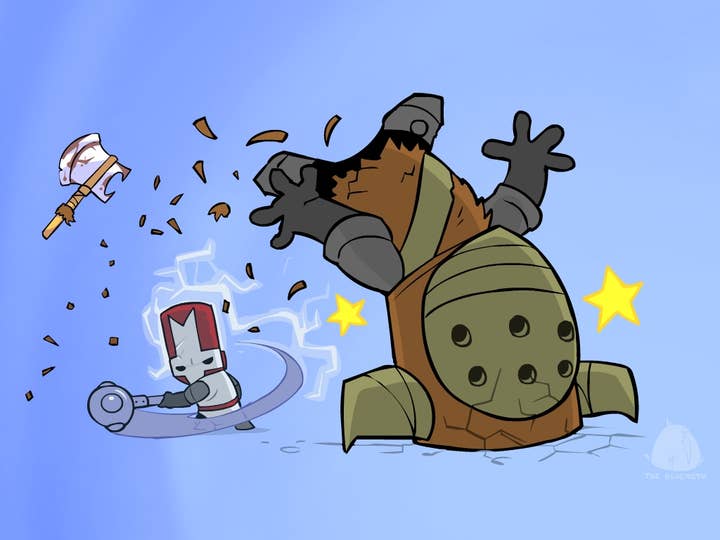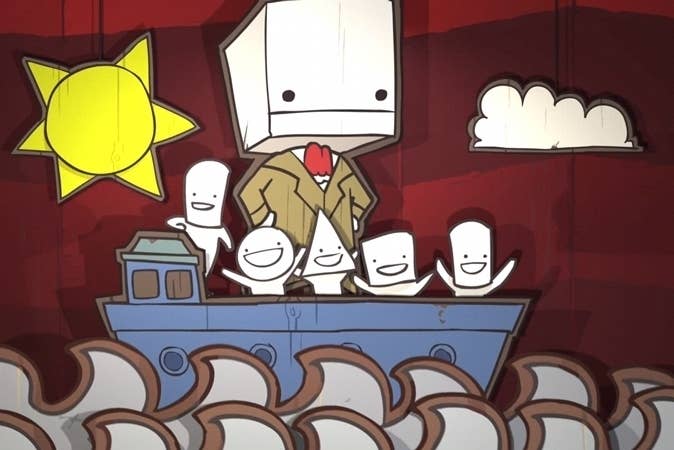Industry instability is here to stay, says The Behemoth
BattleBlock Theater devs say chaos will keep everything moving forward, studios big and small always face the same hurdles
Anyone hoping that a new generation of consoles will bring some stability to the game industry is bound to be disappointed, according to the co-founders of Castle Crashers developer The Behemoth. In an interview with GamesIndustry International, the studio's John Baez and Dan Paladin dismissed the notion that the advent of digital distribution and crowdfunding would combine to stabilize the indie gaming scene (or any other scene, for that matter).
"We're definitely getting more options but I don't think us or anyone else will ever be 'stable', per se," Paladin said. "I say this because game development--whether AAA, mid-size, or small--has always been the same big-size gamble. As a developer you'll spend (proportionally to your size) a very large amount of money on something you can only hope people want to play. You live game-to-game, because that's where all your income is coming from. If your latest game doesn't do well that's probably the end of it for you no matter whether you're big or small. Gargantuan companies get a bit more leeway of course!"
"If your latest game doesn't do well that's probably the end of it for you no matter whether you're big or small."
Dan Paladin
Baez agreed, saying all studios are constantly balancing the cost of development against the number of expected customers.
"In a way it is kind of a crap shoot since a big studio with a big budget and a well-reviewed game can still go bankrupt and a small four-man studio can crank out what looks like an unfinished game and make millions," Baez said. "It is that kind of serendipity that will keep the industry moving forward."
In addition to that serendipity, Baez said the tight job market is pushing the industry forward because schools are producing trained artists and programmers at unprecedented rates.
"In our first eight years everyone was self-taught, which is something we look for in a candidate," Baez said. "Now however, many people apply after getting some sort of degree or certificate. There seems to be such a glut that these people are going to have to make new studios because there just is not enough development going on to absorb all these people."

In some ways, it's a similar situation to the one that spawned The Behemoth in 2003, when the company's cofounders felt their options were to jump ship from an established console developer or wait to be laid off. Since then the studio has released three major games: Alien Hominid, the aforementioned breakout Xbox Live Arcade hit Castle Crashers, and the just-launched BattleBlock Theater. Despite the success, Baez said little has changed in how the studio makes its games.
"When I look around the office I can still imagine us as the super small studio that we were years ago," Baez said. "We have been able to build some new tools, but for us, nothing has changed much. Everyone still needs multiple skill sets to work here. We still take on more than is good for us. The 55-gallon drum which has been converted into a trash can still occasionally burst into flames."
The Behemoth has also kept up its relationship with Microsoft. It used Xbox Live Arcade to launch the HD downloadable edition of Alien Hominid, Castle Crashers was part of the first Summer of Arcade promotion, and BattleBlock Theater is currently exclusive to Microsoft's digital storefront. Although The Behemoth has also dabbled on iOS for a couple projects and Paladin expressed an interest in mobile platforms, don't expect the studio to embrace them whole-heartedly anytime soon.
"The future in digital distribution will be curated feeds."
John Baez
"I think we tend to prioritize survival over exploration," Paladin explained.
And while The Behemoth has thrived to date within the comparatively closed ecosystem of Xbox Live Arcade, PlayStation Network, and Steam, Paladin noted that every approach to gatekeeping has its own advantages and drawbacks. Gatekeeping is essentially quality control, he explained, and an overly strict strategy keeps some good content out, while a hands-off approach lets markets get clogged with junk and forces end users to essentially handle their own gatekeeping.
"So is the filter better or is the freedom better? It really depends on where you're coming from and what your tastes are," Paladin explained.
Baez followed up on the idea of users doing their own gatekeeping, saying, "The future in digital distribution will be curated feeds."
"To some extent this is what a portfolio manager does at the hardware manufacturer, but I think as more content becomes available you are going to see individuals who are not devs and maybe not working at hardware companies becoming the 'trusted source' of what is good out there in the mass of games," Baez said. "This will differ than just ratings or being a reviewer; I think it will become more like your favorite radio DJ who you listen to because you like their taste."
He pointed to Ben Croshaw's Zero Punctuation as one particularly strong example of the idea.
This is one in a series of GamesIndustry International interviews with independent developers on the changing role of indies in the industry landscape.

